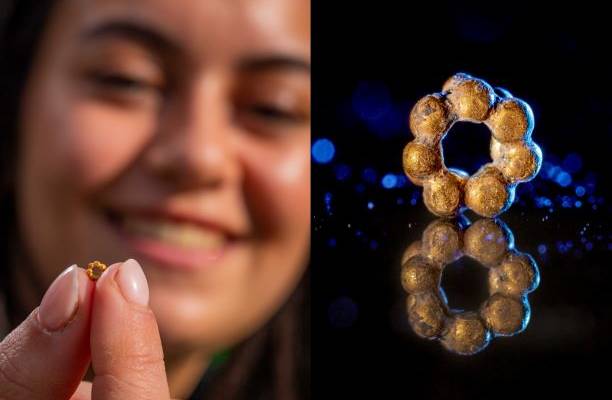An Israeli teenager volunteering at an archaeological dig discovered a golden bead that dates back to the Roman occupation of the Land of Israel.
By United with Israel Staff
On Wednesday morning, the Israel Antiquities Authority (IAA) announced a major find recently discovered in Jerusalem’s City of David.
An 18-year-old named Hallel Feidman from the town of Bnei Ayish found a rare gold bead dating to the end of the Roman Era, about 1,600 years ago.
“I poured the pail onto the sieve and began to wash the material that was brought from the excavations in the City of David, ” Feidman explained in an official IAA statement. “And then I saw something shiny in the corner of the sieve, different, that I don’t normally see. I immediately approached the archaeologist and he confirmed that I found a gold bead. Everyone here was very excited.”
Feidman is a volunteer who is performing her Israeli National Service with an IAA sifting project, the Archaeological Experience in the Emek Tzurim National Park.
The dirt in which Feidman found the bead was extracted from a Roman structure as part of the the Pilgrimage Road Excavation. The technique used to fabricate the bead involved combining multiple gold spheres into a circular shape that ultimately formed a bead.
“Throughout all my years in archaeology, I have found gold perhaps once or twice, so to find gold jewelry, is something very very special,” commented Dr. Amir Golani, an IAA expert in ancient jewelry.
According to Golani, the bead was likely part of a bracelet or necklace
“Whoever could afford a piece like this made from gold, was an affluent person, with means,” added Golani. “Only a professional craftsman could produce such a bead, which is another reason that this find holds great value.”
Turning to the structure in which the bead was found, IAA Excavation Directors Shlomo Greenberg and Ari Levy explained, “The bead originated in a grandiose structure which is at least 25 meters long. The structure was built on the Pilgrimage Road in the City of David, in a building style that characterizes upscale buildings. The wealth of the building’s occupants is evidenced by additional finds that were discovered in it, like imported clay vessels and a decorated mosaic floor.”
